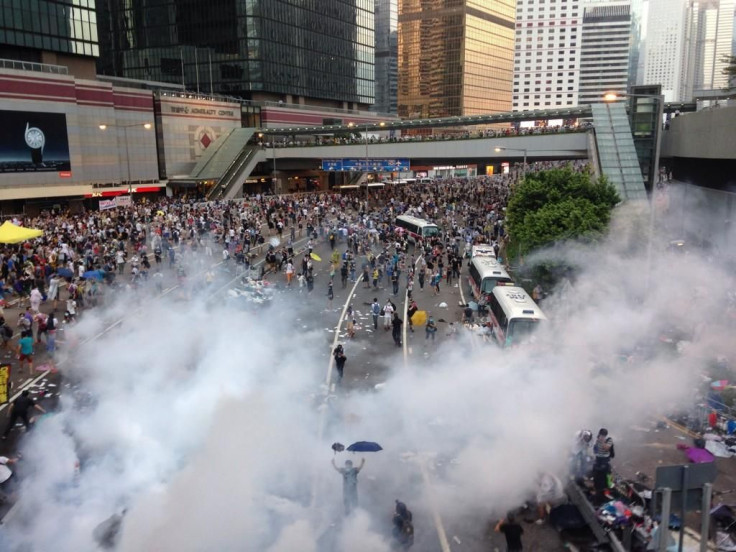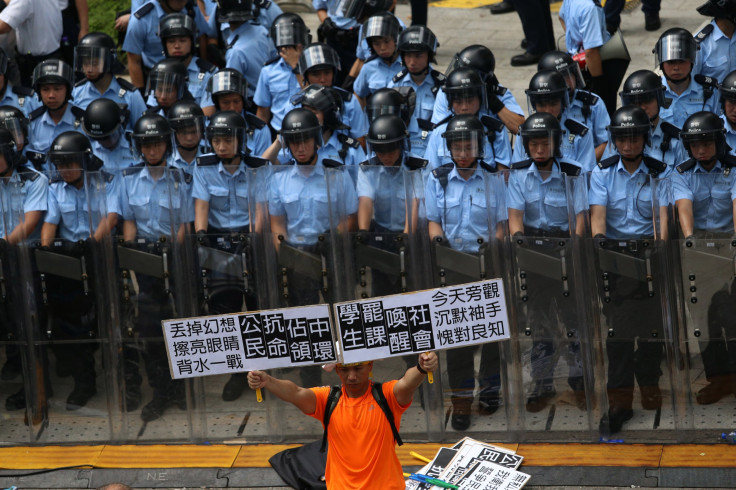Occupy Central Pro-Democracy Protests Get Underway In Hong Kong

Update 12:30 p.m. EDT: CNN reports at least 26 people were hospitalized in the Occupy Central protest in Hong Kong. Hospital authorities did not detail the injuries. CNN said six police officers were hurt but it was unclear whether they were among the 26.
Update, 6:13 a.m. EDT: Police have fired tear gas at pro-democracy demonstrators in Hong Kong, according to reports on social media.
TEAR GAS #OccupyCentral pic.twitter.com/tHqNuXtaVK
— Phila Siu (@phila_siu) September 28, 2014Occupy Central’s offical Twitter account quoted an organizer as saying that tear gas had been fired.
Pictures posted on Twitter show clashes between police and protesters:
Tear gas = "higher degree of force" promised by HK police #OccupyCentral http://t.co/G8DB3apcYn @SCMP_News pic.twitter.com/PviwVY123H
- Kristine Servando (@tinssoldier) September 28, 2014@gracehw: Police officers hit protesters with baton. Picture from Now TV. pic.twitter.com/sOn5vEOvGH
— Grace Tsoi (@gracehw) September 28, 2014Update, 5:35 a.m. EDT: Police in Hong Kong have used pepper spray against demonstrators associated with the Occupy Central With Love And Peace movement, and some officers have reportedly been injured in clashes.
The South China Morning Post reported the situation is quickly escalating, with dozens of police officers in riot gear and gas masks at the scene of the protests. The newspaper said pepper spray is being used “much more,” and that a police officer held aloft a red banner with the words, “Stop charging or we will use force,” as demonstrators attempted to gain entry to the main protest site.
LIVE: Police hurt and protesters pepper-sprayed as #OccupyCentral rally turns ugly http://t.co/3kYvAGsEOq pic.twitter.com/wCW735bebH
- SCMP News (@SCMP_News) September 28, 2014The clashes came after Hong Kong Chief Executive CY Leung pledged to deliver “further [public] consultations” on the city's democractic development, and urged people not to join the “illegal” protest, according to BBC News.
Original Story Appears Below
Occupy Central, a long-touted civil-disobedience movement to protest China’s restrictions on democracy in Hong Kong, began operations in earnest early Sunday. Thousands of demonstrators took to the streets around the city’s government headquarters, and thousands of police officers followed suit, setting the stage for a potential clash between activists and authorities.
The launch of the protest movement followed two days of demonstrations at government headquarters by student groups, which called for greater political freedom in the city.
The protests aim to pressure the Chinese government to allow free democratic elections for the post of the city's chief executive. The Standing Committee of the National People’s Congress ruled Aug. 31 that any candidates for the post in the semiautonomous region’s 2017 elections would have to be nominated by a committee widely seen as being stacked with pro-Beijing members.
According to the South China Morning Post, police made 78 arrests in the three days since demonstrations began at the government complex. Prominent pro-democracy lawmakers Albert Ho and Emily Lau were reportedly detained during the protests Sunday.
Photos posted on social-media sites showed thousands of demonstrators being confronted by police officers:
People defy police. Open the way! #occupycentral #hkclassboycott Police are redeploying here pic.twitter.com/jC8wuAymEu
- Expats 4 HKDemocracy (@EXPATS4HK) September 28, 2014Publishing tycoon Jimmy Lai, owner of the city’s outspoken Apple Daily newspaper, and a key backer of the democratic movement, said he wanted as big a crowd as possible: “The more Hong Kong citizens come, the more unlikely the police can clear up the place,” Reuters quoted Lai as saying.

The movement aims to apply pressure against authorities by occupying the city’s central business district (known as Central) to disrupt business in the city. Business groups in the city have been vocal in their opposition to any such occupation, saying in advertisements taken out in the local press “the social unrest and political instability created by Occupy Central will deter foreign companies from investing in Hong Kong, thereby creating an enormous ripple effect throughout the local economy [and] ... reducing employment opportunities.”
Demonstrators sported plastic ponchos and painting goggles, seemingly in preparation for the possible use of pepper spray by authorities. Student protesters at the government complex this week were subjected to the use of pepper spray by police.
Medical students ready to help anybody sprayed with pepper spray #occupycentral pic.twitter.com/v4o7PWjvj5
- Demetri Sevastopulo (@AsiaNewsDemetri) September 28, 2014China’s central government has opposed the protests. Joshua Wong, the leader of student group Scholarism, was accused by Beijing authorities of being an agent of the U.S. government after his arrest this week at the protests, the Wall Street Journal reported.
© Copyright IBTimes 2024. All rights reserved.






















